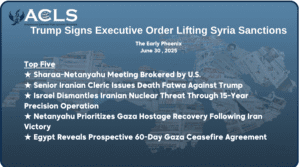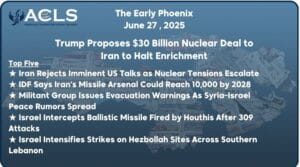Executive Summary
In the latest episode of ‘The Phoenix’ Podcast, listeners were treated to the expert insights of Norman Roule, a prominent figure with a storied 34-year career in the CIA, primarily focused on Iran and the Gulf region. This episode comes at a critical time, as tensions in the Middle East continue to affect global politics and security. Roule, with his deep understanding of the region’s complex dynamics, sheds light on the current Iranian crisis and its far-reaching implications.
Iran’s Maritime Aggression, Proxy Tactics, and Global Response.
Shifting focus to Iran’s maritime strategies, Roule delves into another critical aspect of Iran’s approach to regional dominance.Iran’s aggressive maritime activities present a significant threat to global security and trade. Reminiscent of the tactics used during the 1988 tanker war, Iran’s actions in international waters have disrupted key shipping routes, with far-reaching economic repercussions. The crisis has especially escalated in the Red Sea, impacting over 36 countries and jeopardizing trade valued at approximately $200 billion. This maritime aggression not only threatens international shipping but also raises concerns over energy supply stability, leading to increased costs and delays in global supply chains.
Beyond its direct actions at sea, Iran’s sophisticated use of proxy forces forms a crucial part of its regional strategy. The support for the Houthi movement in Yemen is a prime example. Iran’s involvement has gone beyond mere financial and logistical aid; it includes the transfer of military technology, such as advanced drones and missile systems, significantly enhancing the Houthis’ capabilities. This proxy warfare has broader implications: it allows Iran to exert influence and disrupt its adversaries in the region without direct engagement, thereby complicating international response strategies.
The Houthi movement, emboldened by Iran’s support, has posed severe challenges to Saudi Arabia and other Gulf states. Their actions, which include cross-border attacks and disruptions of maritime routes, reflect a broader Iranian strategy to project power and destabilize regional adversaries. The sophistication and intensity of these proxy operations have necessitated a reevaluation of global and regional security strategies, underscoring the need for a coordinated international response.
In addressing this challenge, Mr. Roule emphasizes the crucial role of nonpartisan intelligence in shaping effective U.S. and international policy. He points out the complexities that policymakers face in crafting a response that balances the need for security, the stability of global trade, and the nuances of regional geopolitics. The necessity for decisive action to deter Iran’s destabilizing activities is more important than ever, particularly in preventing further escalation and addressing the growing concerns over Iran’s ballistic missile development and its broader regional ambitions.
Iran’s Advancing Nuclear Capabilities and Global Implications.
Turning to Iran’s nuclear ambitions, Roule discusses the nation’s alarming progress. Iran is on the brink of achieving nuclear weapon capability, enriching uranium to 60% purity – a level with primarily military applications and often a precursor to nuclear weapon development. The International Atomic Energy Agency’s latest report underscores this rapid advancement. This development is particularly concerning as the global community’s response has been relatively subdued, hinting at a passive acceptance of Iran’s nuclear militarization, despite the ineffectiveness of current rhetoric and sanctions.
Waning Domestic Support and Political Dynamics in Iran.
The conversation then takes a turn to internal Iranian dynamics, an area where Roule provides equally insightful analysis. In Iran, public support for the regime has been declining since 2017, with frequent protests highlighting social oppression and economic struggles. Comparisons with Gulf countries underscore public dissatisfaction with the corrupt and oppressive government. Despite some support for the regime, widespread dissent is notable.
Iran’s opposition, fragmented without a unified leader or clear objectives, engages in frequent economic protests, averaging about a hundred annually. While these protests have not yet coalesced into a larger political movement, they indicate potential for nationwide unrest and contribute to regime instability in the post-Khomeini era.
The Supreme Leader’s poor health has prompted key figures like Ebrahim Raisi, head of the IRGC and the Ministry of Intelligence and Security, to prepare for the future. Raisi, favored by hardliners for long-term leadership, has reshaped the political landscape by purging moderates and reformists, consolidating power through anti-corruption drives and political tactics. This has weakened factions like Rafsanjani’s.
The impending Assembly of Experts elections, crucial in choosing the next Supreme Leader, are expected to be dominated by hardliners. Possible outcomes include Raisi becoming Supreme Leader or assuming a significant role like prime minister or president. Hardliners, particularly military figures committed to the revolution, are anticipated to continue their assertive foreign policy and domestic repression to secure their power and influence.
Strategic Analysis on Iran’s Influence and Need for Effective U.S. Leadership.
Mr. Roule’s analysis focuses on the effectiveness of U.S. sanctions under Obama and Trump in reducing Iran’s support for groups like Lebanese Hezbollah and the Houthis, though he notes their resurgence once sanctions are lifted. He advocates for a balanced approach of diplomatic and economic pressure to modify Iran’s behavior, despite challenges from its participation in global institutions.
Highlighting inconsistencies in international policy towards Iran, Mr. Roule points to events like the Iranian foreign minister’s invitation to the World Economic Forum as contradicting Iran’s aggressive regional activities. Iran’s strategy of financially backing its proxies and firms affects local economies and maintains its military leverage. Concerning the Israeli-Palestinian conflict, he expresses reservations about a Hamas-led state in a two-state solution.
Mr. Roule also discusses the negative impact of terrorist organizations on state governance and the obstacles Iran poses to peaceful governance and a two-state solution. He questions the global community’s preparedness to counter Iran’s disruptive role in the Middle East and stresses the need for U.S. leadership in global conflicts. He emphasizes understanding regional perspectives and valuing local insights for effective policy making.
Recognition of ACLS.
Finally, Mr. Norm Roule highlighted the work of ACLS and said “In conclusion, I want to thank ACLS for its amazing products and incisive analysis. It’s something I read every day, and if I don’t read it every day, it sits there. And because I’m not going to delete it until I get a chance to read it and take notes, thank you for what you do. You have a powerful voice and a voice of rigorous analysis, analytic reason that I really value.”



